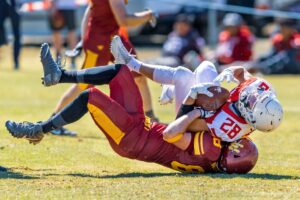When an athlete faces significant injury, there are a number of predictable emotions and phases he/she may experience. A serious injury often requires surgery, recovery time and physical therapy. After surgery, many athletes often replay the injury in his/her mind, feel afraid, feel angry, and wonder “Why did I make that play?” Many athletes feel they have let their parents, coach, or team down. Most worry about what might happen if they don’t fully recover.
During his or her recovery from injury, the athlete spends less time with their team mates and coaches, and may feel left out or isolated. He or she may experience feelings of depression, anxiousness, and sadness. Because of his or her emotions, the athlete may not want to be around others. Often, an athlete will withdraw, which provides temporary relief from his or her feelings. Unfortunately, being away from others, particularly team mates and coaches, keeps the athlete away from the support and energy they need to recover. The emotional experience from injury may cause the athlete to be moody, grouchy, and easily irritable. He or she may stop attending games and normal social events. Relationships with important people in their lives (friends, parents, girlfriends/boyfriends) often strain due to the athlete’s mood.
During physical therapy, the athlete might find themself becoming frustrated, angry, and depressed. The athlete often becomes frustrated with therapy, as he or she is not making progress as quickly as he or she expected. Frustrations can cause the athlete to become demanding and angry with his or her physical therapist/trainer. In times of high frustration or anger, some athletes will ignore his or her trainer/physical therapist’s recommendations, and push ahead of schedule. Lack of patience and pushing too fast runs the risk of re-injury. During a period when the athlete needs the support and guidance of excellent trainers/physical therapists, the athlete can ignore these important supports assistance.
Meeting with a sports psychologist who listens to the athlete’s story and understands his or her unique struggles helps many injured athletes. Athletes feel safe voicing their anger, sadness, frustration, and fears with a sports psychologist. After he or she has discussed their emotions, the athlete and sports psychologist can identify the skills he or she developed in becoming a top athlete, and how to utilize these strengths to help cope with his or her injury. Through the use of specific sports psychology techniques such as guided imagery, goal setting, and confidence exercises, the athlete learns to successfully manage his or her emotions and decisions. As the athlete gains confidence and a positive mind set, they feel comfortable re-engaging with their team mates and coaches. Now, the athlete is ready to use his or her new skills, accept the support of others and make healthy decisions about training and returning to competition.




